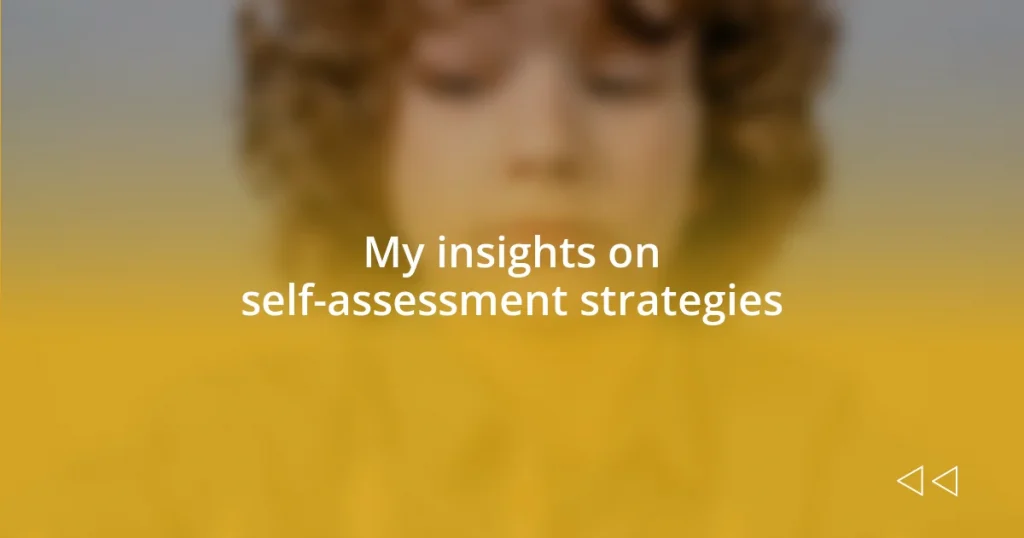Key takeaways:
- Self-assessment enhances self-awareness, decision-making, and resilience, fostering personal and professional growth.
- Incorporating feedback through structured approaches reveals blind spots and guides improvement, transforming feedback into a collaborative tool.
- Continuous self-assessment cultivates a growth mindset, allowing for incremental changes and learning from failures to enable ongoing development.

Understanding self-assessment strategies
Self-assessment strategies are essential tools for personal growth, allowing us to reflect on our strengths and weaknesses. I remember the first time I genuinely evaluated my skills for a significant project; it was both eye-opening and daunting. Have you ever sat down and asked yourself, “What can I improve?” This question can lead to profound insights about your capabilities.
When I think about self-assessment, I often recall how a simple checklist transformed my approach to task management. Rather than just consuming time mindlessly, I began to track my progress, which made each accomplishment feel tangible. It’s incredible to experience the shift in mindset; self-evaluation transforms from a chore into a motivating factor that fuels our desire to excel.
Engaging in self-assessment isn’t just a solitary endeavor; it opens doors to feedback from others, enriching our understanding of ourselves. Have you ever sought a friend’s perspective about a skill you thought was rock-solid? Hearing their thoughts revealed blind spots I hadn’t considered. It’s an ongoing journey where each assessment deepens our connection not only to our abilities but also to our aspirations.

Importance of self-assessment
The importance of self-assessment can’t be overstated. Reflecting on my career, I’ve experienced moments that shifted my trajectory entirely. For instance, after a particularly challenging period, I sat down to assess what I truly valued in my work. That process helped me identify my core skills, enabling me to seek opportunities that aligned with my passions.
One of my recurring experiences is the clarity self-assessment brings to decision-making. Early in my career, I often felt overwhelmed with choices. It wasn’t until I began to evaluate my preferences and experiences that I became adept at choosing paths that resonated with my long-term goals. I’ve learned that this practice not only enhances self-awareness but also fosters confidence in taking those critical steps forward.
Moreover, self-assessment cultivates resilience. There was a time when I faced a setback that shook my confidence. Instead of wallowing in frustration, I used that moment as an opportunity to re-evaluate my strategies and emotional responses. This introspection guided me in developing a stronger mindset and determination, enabling me to bounce back even more effectively. It’s this cycle of self-reflection and growth that truly underscores the significance of self-assessment in our lives.
| Aspect | Impact |
|---|---|
| Self-awareness | Helps identify strengths and weaknesses |
| Decision-making | Enhances ability to make aligned choices |
| Resilience | Fosters a growth mindset after setbacks |

Effective self-assessment techniques
Self-assessment techniques can be incredibly effective when approached thoughtfully. One method that I’ve found particularly helpful is setting aside dedicated time for reflection. I tend to block out an hour each month just to think about my performance and personal growth. It’s a low-pressure way to scribble down thoughts about what went well and what could use a little TLC. By creating a routine, I’ve noticed that these reflections provide deeper insights over time.
Here are a few effective self-assessment techniques to consider:
- Journaling: Regularly writing about your experiences strengthens your ability to recognize patterns.
- Goal Tracking: Keeping a checklist or a progress tracker fosters accountability and motivation.
- Feedback Sessions: Actively seeking input from trusted peers or mentors can reveal strengths you might overlook.
- SWOT Analysis: Evaluating your Strengths, Weaknesses, Opportunities, and Threats provides a structured way to visualize your position.
- Mind Mapping: This creative technique organizes thoughts and feelings, helping to clarify your standpoint on various issues.
I remember using a goal tracking app for a couple of projects. Initially, it felt like just another task, but as I watched my progress visually accumulate, I became inspired. Each little achievement turned into a stepping stone, and I realized the power of small wins in maintaining my motivation. Self-assessment can sometimes feel daunting, but it can become one of your most empowering allies.

Tools for self-assessment
When it comes to tools for self-assessment, I can’t emphasize the value of digital apps enough. For instance, I started using a personal development app that not only tracks my goals but also reminds me to reflect on my progress weekly. That accountability made me realize I was more committed to my growth than I initially thought—how many of us need that little nudge to stay on track?
Another invaluable tool is the simple yet effective practice of journaling. I remember during a particularly hectic phase, I made it a ritual to jot down a few thoughts each night. This practice didn’t just help me unwind; it brought clarity to my struggles. Ever wonder how much insights can flow once you put pen to paper? It’s often in those quiet moments that I unearthed my most profound reflections.
Lastly, let’s talk about feedback sessions. I used to shy away from asking for constructive criticism, but that changed when I invited a trusted colleague for a coffee chat. To my surprise, their insights didn’t just sting—they guided me to developing skills I’d overlooked. Have you ever realized that feedback can sometimes serve as a roadmap, pointing out paths you hadn’t considered? Engaging in such dialogues can reveal perspectives that enhance your self-assessment journey, making it a two-sided conversation rather than a solitary one.

Reflecting on self-assessment outcomes
Reflecting on self-assessment outcomes is vital for genuine growth. I remember one night, after a long week, I sat down with my journal and just poured out all my thoughts on recent projects. Initially, it felt like a chore, but as I wrote, I realized I had completely overlooked my improvements. Have you ever experienced that moment when you see your own progress staring back at you in black and white? It can be incredibly uplifting.
Sometimes, I find myself revisiting my self-assessment results, like an old friend who holds valuable memories. This act of reflection not only allows me to acknowledge my achievements but also highlights areas that still need work. The more I delve into my assessments, the clearer the path becomes. I ask myself: where do I want to be next month? Next year? It’s intriguing how self-reflection can shift my focus from worry to a more structured approach towards my goals.
Engaging with my self-assessment outcomes often uncovers unexpected insights. I once overlooked a personal strength that a mentor pointed out during a feedback session. That realization opened new doors in my projects and even boosted my confidence. I often wonder, what hidden potential lies beneath the surface of our assessments? Just like unearthing a hidden treasure, reflecting on these outcomes can illuminate paths I never knew existed.

Incorporating feedback into self-assessment
Incorporating feedback into self-assessment can be a game changer. I recall a time when I was stuck in a rut, and a mentor suggested I gather feedback from my team. Their perspectives revealed blind spots I hadn’t even considered. Have you ever had an “aha” moment when feedback transformed your understanding? That shift in perspective can be eye-opening.
One key strategy I’ve adopted is creating a structured approach for gathering feedback. I set up monthly check-ins where I ask for specific input on my projects. The first time I did this, I was nervous and bracing for criticism. Instead, I was met with constructive insights that guided my next steps. It made me realize that welcoming feedback fosters growth; it’s not about criticism, but about collaboration on a shared journey.
I also make it a point to actively reflect on feedback after receiving it. There have been times I’ve taken comments to heart and integrated them into my work, leading to immediate improvements in my performance. I often ask myself: how can I use this insight to become better? That simple question transforms feedback into a powerful tool, helping me refine my self-assessment and progress.

Continuous improvement through self-assessment
Continuous improvement through self-assessment is a transformative process. There was a moment during my early career when I felt stagnant. I decided to create a weekly routine where I would evaluate my performance every Friday. It was a simple step, yet it provided clarity on my progress and revealed patterns I hadn’t noticed. Have you ever taken a step back and seen the bigger picture of your journey? It can truly change your perspective.
As I engaged consistently in self-assessment, I started seeing incremental changes. After a while, I began setting small, specific goals every month based on my assessments. For instance, one month I aimed to enhance my public speaking skills after recognizing how stifled my presentations felt. Each week, I would jot down my reflections and intentions, shaking off any self-doubt as I prepared for improvement. This practice made me realize that achieving growth doesn’t always mean revolution; sometimes, small shifts lead to substantial progress.
In my experience, having a growth mindset is essential. I once struggled with a failed project and used my self-assessment to dissect what went wrong. By viewing failure as a learning opportunity, I developed strategies to avoid similar pitfalls in the future. Don’t you find it fascinating how failure can often teach us more than success? Embracing this viewpoint allows self-assessment to become a continuous loop of discovery and enhancement in our professional lives.















